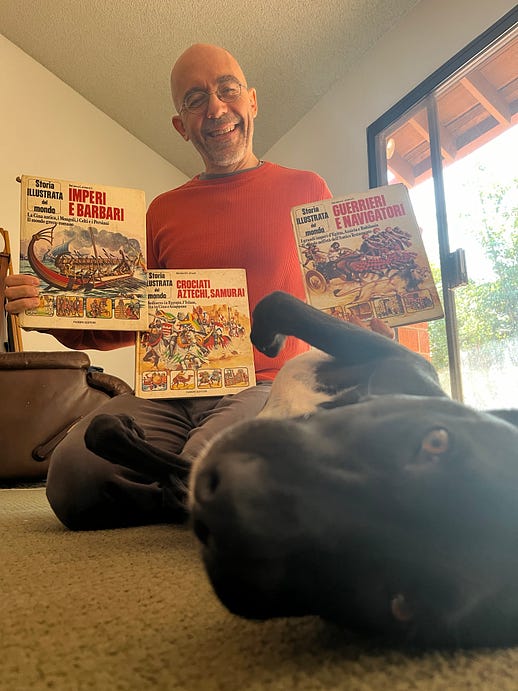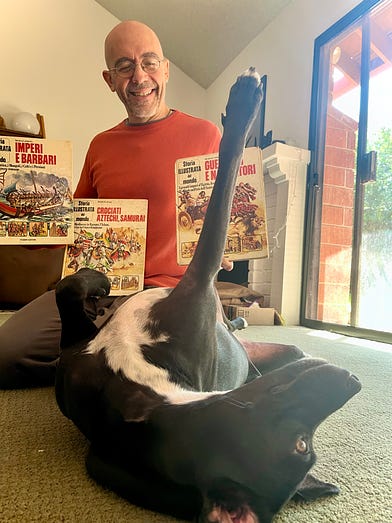I have been teaching History at the university level for the past twenty-three years. I have been hosting the History on Fire podcast for nine. And if the gods of publishing are kind to me, I’d love to spend the next few years cranking out historical fiction novels. In light of this, I get asked certain questions on a regular basis. Why study history? How is it useful? What do you like about it? How did you get into it? In one of the earliest posts on my substack, I tackled the question of what I find inspiring in the study of history. Today, I’ll tackle it from a different angle. If it’s not too traditional for you, let’s start at the beginning. When I learned how to read, some of the first books I ever received as gifts were illustrated history books. For being books designed for kids, they were surprisingly well written and packed with fairly accurate information. And I devoured them. It was the very beginning of the 1980s and, of course, there was no internet, and few TV channels (at least in Italy). I didn’t even have access to a VCR or video games. Add to this that I was an only child. All this to say I spent a decent chunk of time on my own, and the options for pre-packaged entertainment were limited. So, I’d dive into books and let my imagination run wild. The images and the info I found were the raw material that I’d use to create movies in my head. Inventing stories for an audience of one was my primary way to entertain myself. A two-page color illustration packed with dozens of characters would allow me to get lost for hours looking at a Mongol camp on the move after the sacking of a city, or thinking of possible backstories for every character I saw depicted shopping in the marketplace in Tenochtitlan, or laughing at kids playing pranks in the background while their parents were busy building Stonehenge. I started taking pictures of some of the pages from these books, since words don’t do them justice, but then I remembered copyright trolls are anxiously looking for the most minute infractions in order to extort money, so unfortunately my words will have to do (I’ll include at the bottom a list of a few of the titles I’m referring to). That’s how it all started for me. I didn’t get into history because of any of its supposed other benefits. I got into it because it was fun. If I were to dive a little deeper into why it was and still is fun to me, I think it’s because nothing can teach you about human beings as much as history does. Quite literally, it’s a record of who we have been and what we have done up until the present. Any other discipline teaching us about what it means to be human—from psychology to economics—is part of history. You are into sports? They are part of history. Cooking? Check. Sex? Check. Philosophy? Check. History gives us access to the experiences of millions of people, to ideas and ways of life that may be different from what we are familiar with. And this allows us to view history as a laboratory where people have made experiments for centuries, and we get to learn from the results of those experiments. Robert Greene has a brilliant quote about this: “Writers who have delved into human nature, ancient masters of strategy, historians of human stupidity and folly, kings and queens who have learned the hard way how to handle the burdens of power—their knowledge is gathering dust, waiting for you to come and stand on their shoulders. Their wit can be your wit, their skill can be your skill, and they will never come around to tell people how unoriginal you really are. You can slog through life, making endless mistakes, wasting time and energy trying to do things from your own experience. Or you can use the armies of the past. As Bismarck once said, ‘Fools say that they learn by experience. I prefer to profit by others’ experience.’” As you may imagine, I can go on about this topic until you’ll be begging me to stop and shut up. For the sake of avoiding that, I’ll stop now and turn the question around for you to mull over. What do YOU find valuable about history? P.S. as promised, here’s a list of some of the books I was referring to. The full list is much longer than this, but these titles can give you the idea of what I’m talking about. - Warriors & seafarers from 1500 BC to 500 BC -- Millard, Anne; McEwan, Joseph -- 1977 - Empires and barbarians -- Vanags, Patricia -- [Adelaide], 1977 - The Aztecs -- Crosher, Judith – 1976 - Crusaders, Aztecs, samurai from AD600 to AD1450 -- Millard, Anne; McEwan, Joseph - The Time Traveller Book of Rome and Romans -- Amery, Heather – 1976 -Indians of the Crow Tribe—Chesneau, Andrè – 1980 Invite your friends and earn rewardsIf you enjoy Daniele’s Substack, share it with your friends and earn rewards when they subscribe. |


